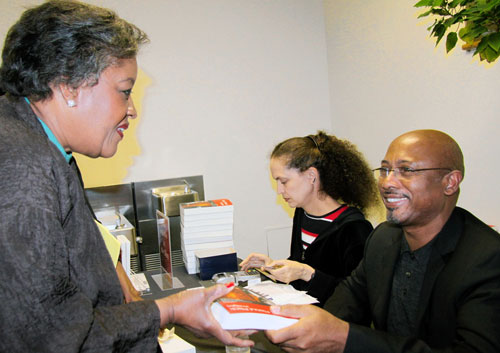The good, bad and ugly of Haiti’s journey though History and independence from France will be the focus of four films slated to begin screening on Dec. 2 at 8:00 p.m. at The Chapel at Teacher’s College. The first is titled “Toussaint Louverture” and considered a “long-awaited, two-part epic film depicting the life of the Haitian leader.”
According to historic notes, Louverture led the first successful slave revolt in world history, defeating Napoleon Bonaparte and winning independence from France. Known for his military genius and political acumen, Louverture established Haiti as the first Black nation in the western hemisphere and the first Black free nation as well. The success of Louverture and the Haitian Revolution rocked the institution of slavery throughout the “New World” of the Americas.
Directed by Philippe Niang, two 90-minute films will reprise the history in French and Creole with English subtitles.
On Dec. 7 at 1:00 p.m. “Looking For Life” introduces patrons to two women, Anne-Rose and Rosemene, who each has their own particular way of battling through life. The former makes lunches in a factory yard in Port-au-Prince and sells her meals to the factory workers; the latter is employed in the same factory as a production worker making pullovers and T-shirts. Every day she buys her midday meal on credit from Anne-Rose. Through the connection between these two women, the film shows part of their daily work and the constant battle for survival that they lead together with other women in Haiti. Going beyond this, however the film demonstrates the extent to which the importation of North American goods has brought about the collapse of Haitian regional production and ruined Haiti’s economy. The connection between the two topics of the film reveals the significant role that Haitian women of today play in an economy that has been bled dry. The film is directed by Claudette Coulanges, and runs for 60 min. Produced by a collaborative with Haiti and Germany, the documentary is presented in Creole, French with English subtitles.
Later that afternoon at 3:00 p.m., “Fatal Assistance” directed by Raoul Peck takes audiences on a two-year journey inside the challenging, contradictory, and colossal rebuilding efforts in post-earthquake Haiti. Through its provocative and radical point of view, the film offers a devastating indictment of the international community’s post-disaster idealism. The film dives headlong into the complexity of the reconstruction process and the practice and impact of worldwide humanitarian and development aid, revealing the disturbing extent of a general failure. We learn that a major portion of the money pledged to Haiti was never disbursed, nor made it into the actual reconstruction.
“Beyond Haiti ” begins at 5:00 p.m. and ventures to the border crisis where people of Haitian descent are systematically denied citizenship rights in the Dominican Republic. This video is about the Haitian-Dominican community’s resistance in the face of illegal deportations, scapegoating, and exclusion.
Directed by Haitian Women 4 Haitian Refugees, 2013, 15 min, Documentary, Creole with English subtitles.
Simultaneously “Ayiti Toma – The Land of the Living” will make its U.S. premiere. The documentary presents an encounter with the magical Haitian people who arose from the darkness of slavery to create the first Black Republic. It presents “Ayiti Toma,” through Haitians, including politicians, intellectuals, vodou practitioners and youth from hard-hit neighborhoods of Port-au-Prince, and through anthropologists, historians and aid workers, including actor Sean Penn.
Their testimony portrays the vibrant Haitian culture as the key to the future if Haiti is to become the republic for positive reference.
Directed by Joseph Hillel, 2013, the 82 minute presentation is a joint venture with Canada and Haiti. The documentary will be presented in Creole with English subtitles. A question and answer session will follow the screening.
For more info. Log onto www.nyadiff.org.


























